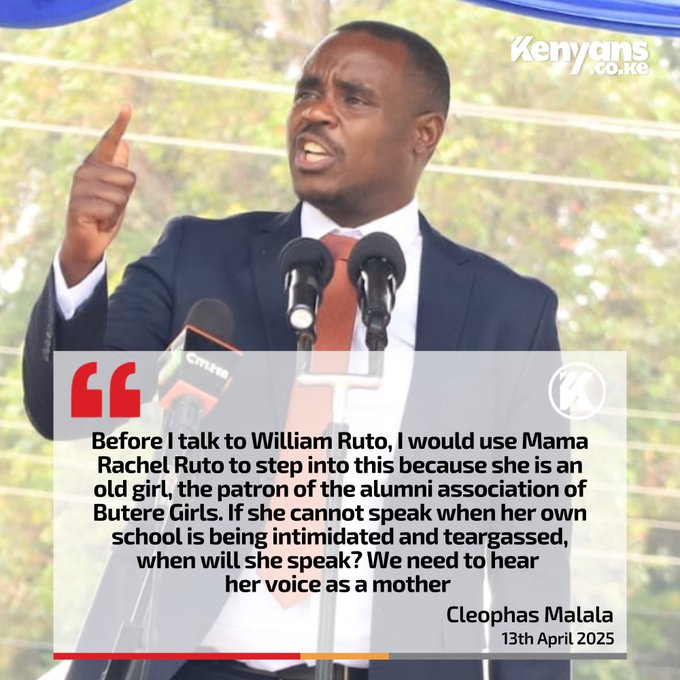NAIROBI, Kenya – After last week’s dramatic halt to Echoes of War—a play by Butere Girls High School students—during the National Drama Festivals in Nakuru, former UDA Secretary General Cleophas Malala has emerged guns blazing.
His main question: Where is Mama Rachel?
Speaking during a Citizen TV interview on Sunday, Malala, is also a seasoned playwright, criticised First Lady Rachel Ruto for her silence over what he calls a state-led crackdown on creativity and youth expression.
And he didn’t stop there—President William Ruto and key government officials also caught some heat.
For Malala, the matter is deeply personal. Rachel Ruto is not only the First Lady but an alumna of Butere Girls, and the current patron of its alumni association.
“If you cannot speak when your own school is being intimidated, tear-gassed, and silenced, when will you speak, Mama Rachel?” he asked. “We need to hear your voice as a mother.”
Malala framed the First Lady’s silence as more than political—calling it a failure of leadership and a missed opportunity to show maternal solidarity.
He urged her to intervene and advocate for the students, who he believes were unfairly targeted for performing a play with strong political undertones.
The controversy began when Echoes of War—a play exploring themes of dictatorship, state violence, and social injustice—was barred from being staged at the Nakuru festival.
The decision sparked public backlash and ignited debate on artistic freedom and state overreach.
Rachel Ruto is the patron of the alumni association of Butere Girls. If she cannot speak when her own school is being intimidated and teargassed, when will she speak? – Cleophas Malala
Students or Citizens? The Debate on Youth Agency
Malala also challenged how the state refers to the students—as mere children. He argued that many of them are near the legal voting age and are already aware of Kenya’s political landscape.
“These young people participate in national conversations,” he said. “By 2027, the same cast will be voters. Will you still call them children then?”
His comments took aim at Transport CS Kipchumba Murkomen and other leaders who downplayed the students’ capacity to grasp political issues.
According to Malala, this tactic is meant to dismiss uncomfortable truths that the play reflects—truths that resonate with the public.
Echoes of War may have been written by students, but its message clearly struck a national chord.
Cleophas Malala: In the script, we do not have any slogan that says Sultan must go. Be it as it may, what is the mistake of saying Ruto must go? In 2006, Ruto himself used to say Kibaki must go. Was it right for him to say Kibaki must go in 2006 and is it now wrong for us to say
A Midnight Ordeal in the Bush: “I Was Terrified”
The drama didn’t end at the festival stage. Malala shared that after being apprehended in Nakuru, he endured a frightening episode at the hands of security officers.
“They drove me to a forested area and left me alone in a parked Subaru,” he recalled. “It was midnight. I was terrified. I didn’t know what would happen next.”
He described the incident as not just traumatic but symbolic of a government slipping into authoritarianism.
“You don’t use force and intimidation against schoolchildren—or against ideas,” he added. “This is not the democracy we fought for.”
Malala’s public criticism adds fuel to a growing fire. As more Kenyans question the government’s response to Echoes of War, the silence from the First Lady grows louder.
The controversy isn’t just about one school play—it’s about who gets to speak, who gets silenced, and whether Kenya is ready to embrace the voices of its youth. And if Echoes of War proved anything, it’s that those voices aren’t going quiet anytime soon.




